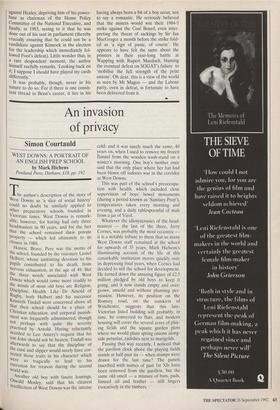An invasion of privacy
Simon Courtauld
WEST DOWNS: A PORTRAIT OF AN ENGLISH PREP SCHOOL by Mark Hichens
Pentland Press, Durham, £18, pp. 192
The author's description of the story of West Downs as 'a slice of social history' could no doubt be similarly applied to other preparatory schools founded in Victorian times. West Downs is remark- able, however, for having had only three headmasters in 90 years, and for the fact that the school remained their private property — which led ultimately to its closure in 1988.
Honest, Brave, Pure was the motto of the school, founded by the visionary Lionel Helbert, whose unstinting devotion to his pupils contributed to his death, from nervous exhaustion, at the age of 49. But the three words associated with West Downs which would come more readily to the minds of most old boys are Religion, Discipline, Health. Like Dr Arnold of Rugby, both Helbert and his successor Kenneth Tindall were concerned above all that their school should be a place of Christian education; and corporal punish- ment was frequently administered, though not perhaps with quite the severity practised by Arnold. Having reluctantly acceded to Leo Amery's request that his son John should not be beaten, Tindall was afterwards to say that the discipline of the cane and slipper would surely have cor- rected those traits in his character which were so tragically to lead to his execution for treason during the second world war.
Another old boy with fascist leanings, Oswald Mosley, said that his clearest recollection of West Downs was the intense
cold; and it was surely much the same, 40 years on, when I used to remove my frozen flannel from the wooden wash-stand on a winter's morning. One boy's mother once said that the only place where her hat had been blown off indoors was in the corridor at West Downs.
This was part of the school's preoccupa- tion with health, which included close supervision of boys' bowel movements (during a period known as 'Sanitary Prep'), temperatures taken every morning and evening, and a daily tablespoonful of malt from a jar of Virol.
Whatever the idiosyncrasies of the head- masters — the last of the three, Jerry Cornes, was probably the most eccentric it is a notable tribute to them that so many West Downs staff remained at the school for upwards of 35 years. Mark Hichens's illuminating account of the life of this remarkable institution moves quickly over its depressing final years, when Comes had decided to sell the school for development. He turned down the amazing figure of £2.5 million pledged by old boys to keep it going, and it now stands empty and over- grown, unsold and without planning per- mission. However, its position on the Romsey road, on the outskirts of Winchester, suggests that this late- Victorian listed building will probably, in time, be converted to flats, and modern housing will cover the several acres of play- ing fields and the square garden plots where we would plant spring onions along- side petunias, radishes next to marigolds.
Passing that way recently, I noticed that the pavilion clock above the playing fields stands at half-past six — when stumps were drawn for the last time? The panels inscribed with names of past 1st XIs have been removed from the pavilion, but the same old smell — a mixture of bats, pads, linseed oil and leather — still lingers evocatively in the timbers.


































































 Previous page
Previous page